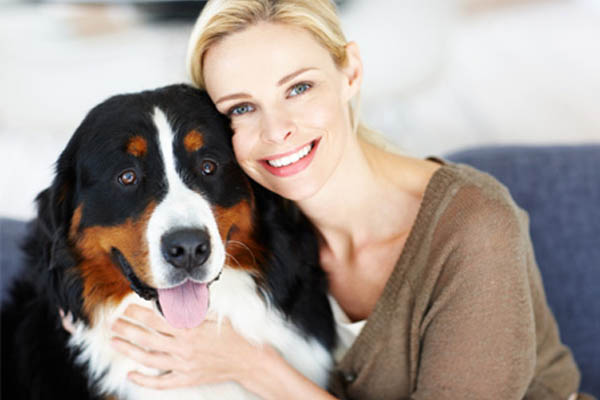Your dog might not be able to talk to you about your bad day at work, but when he lays that little snout on your lap, you sense he just gets it. How much do we really know about what’s going on behind those puppy-dog eyes? “A dog’s mind is roughly equivalent to that of a human two-year-old’s,” says Stanley Coren, PhD, author of The Intelligence of Dogs. “But dogs also have the social consciousness of a teenager.” Put that together with a keen sense of smell, and dogs might be getting a basic read on everything from simple emotions to serious changes in your body chemistry. Read on for eight fascinating facts about the human-dog connection.
1. Dogs sense sadness.
You swear your dog acts extra-tame and attentive when you’re down in the dumps. Is it all in your head-or are your emotions registering on his radar? In a study published in the journal Animal Cognition, dogs did, in fact, approach people who appeared to be upset more often than those who weren’t-whether it was their owner or a stranger. Scientists are still a few steps away from saying dogs have true empathy for humans-it’s possible they’d react the same way to an equally strong emotion, like raucous laughter-but they’re optimistic. “The dogs in the study would lick all around sad people’s hands or faces, and some sweetly brought over toys,” says study author Deborah Custance, PhD, a psychologist at Goldsmiths, University of London. “They behaved in a way we would’ve expected if we interpreted it as empathy.”
2. They know when you’re being unfair-to some extent.
If you play favorites with another pet, your dog might notice, according to a study published in the journal Proceedings of the National Academy of Sciences. Researchers found that when dogs saw other dogs getting treats for a trick they’d been performing unrewarded, the uncompensated dogs became visibly distressed-scratching themselves, yawning, licking their mouths. “Dogs are attentive to different amounts of attention and can react to it,” says study author Friederike Range, PhD, Co-Director of Wolf Science Center in Vienna, Austria. Don’t chalk it up to a more complicated, human-like sort of envy or sense of equality, however. When both dogs in the study received treats, both were happy-even when one was given sausage and the other got a less desirable piece of bread.
3. They can tell when your priorities shift.
When you bring a baby home from the hospital, your pet probably won’t be the focus of your undivided attention anymore. And guess what: He’ll pick up on that pretty quickly. (It can even lead to depression, says Dr. Coren.) But there are ways to make your dog feel loved-and love your baby, in return. “We always tell people to bring an extra swaddling blanket to the hospital,” says Dr. Coren. “Wrap the baby in that, then put it where your dog sleeps-that way, the scent from the very beginning is associated with something he already likes.”
4. They understand when you’re mad.
You know that puppy-dog look you get after giving him some discipline? He definitely senses you’re annoyed, says Dr. Coren. “If you’re angry at your dog, he’ll act submissive-crouch down, whine, whimper,” he says. “If it gets bad enough, he’ll make a puddle on the floor.” But don’t mistake this behavior as showing remorse. In a study published in the journal Behavioral Processes, researchers had dog owners scold their pets, whether or not they had acted up-and found that the “guilty look” didn’t necessarily correspond to the dogs who had actually been naughty.
5. They sense your fear.
Let’s say there’s something menacing in your home, like a rodent or an intruder. As soon as you start giving off scared vibes, your pup will pick up on them. “Dogs read the world by reading us,” says Dr. Coren. But here’s the catch: Unless you have a guardian breed, like a Doberman pinscher or Boxer, your dog will likely be just as scared as you are in that frightening situation. Research shows they’re reading your emotional response-and watching your behavior-to figure out how they should react. In other words, if you act cautiously and back away, they probably will, too.
6. They can tell if you’re generous.
Believe it or not, dogs are watching and listening to your social interactions with other humans-and taking note, according to one study out of the University of Milan. Researchers had dogs observe two actors: one who kindly shared his cereal and sausage bits with a beggar, and another who shooed off the beggar harshly. Scientists found that, more often than not, dogs approached the more generous person when prompted-and it seems that a friendlier tone of voice made a difference. So beware: Your dog may judge your personality while you yell at your husband or kids.
Related: Check out the 9 fights to have with your husband.
7. They sniff out sickness.
Nope, it’s not an urban legend. A slew of fascinating research shows that many diseases, like lung cancer and prostate cancer, cause the body to give off odors that dogs are able to detect. How, you ask? “Depending on the chemical substance, a dog’s nose is between 1,000 and 10,000 times better than a human being’s,” says Dr. Coren. And while dogs were trained to pick up on the scents in the studies, that doesn’t mean your own pup can’t provide some clues about your health. For instance, if he’s sniffing that mole on your leg every day, it could be worth it to have your dermatologist check it out. “We’re not sure dogs know something’s wrong, but they know something’s different,” explains Dr. Custance.
8. They know when you are (and aren’t) paying attention.
Before you leave a low-lying steak on the counter while you dash to the bathroom, consider this: Your pet is probably sneakier than you suspect. In one study, researchers placed treats on the floor in front of several dogs, forbidding them to eat the food. The dogs behaved as long as the person watching them stayed in the room-but when the treats-keeper left? The canines gobbled them up within five seconds. So no matter how disciplined your dog is, exercise caution in the kitchen, especially with items that could be toxic for your pet, like grapes, chocolate and raw meat.
Original article: Source











